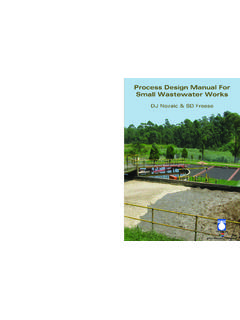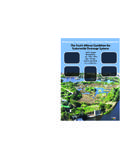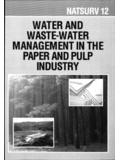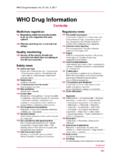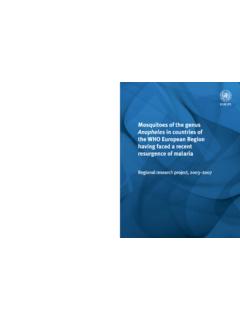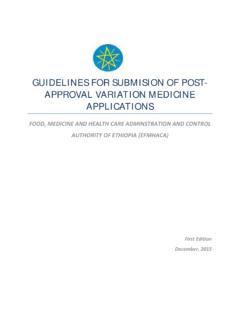Transcription of NATIONAL STANDARDS FOR DRINKING WATER …
1 NATIONAL STANDARDS FOR DRINKING WATER treatment CHEMICALS Report to the WATER RESEARCH COMMISSION by WILSON JOHN and DEBORAH TROLLIP WRC Report No 1600/1/09 ISBN 978-1-77005-850-7 JUNE 2009 ii DISCLAIMER This report has been reviewed by the WATER Research Commission (WRC) and approved for publication. Approval does not signify that the contents necessarily reflect the views and policies of the WRC, nor does mention of trade names or commercial products constitute endorsement or recommendation for use.
2 Iii EXECUTIVE SUMMARY Although it is a statutory requirement that treated DRINKING WATER complies with the South African NATIONAL Standard (SANS 241), the very chemicals used in the process of WATER purification are not subject to any control. It has been widely acknowledged and accepted by stakeholders that the continued use of such chemicals presents a high inherent risk from a public health point of view. The WATER Research Commission (WRC) Project K5/1600 was initiated by Umgeni WATER , the terms of reference being to investigate current international systems used for regulating DRINKING WATER treatment chemicals (DWTCs), to propose a set of STANDARDS that could be adopted for use locally, and to create awareness of the existence of such STANDARDS through a series of workshops.
3 The project commenced with an extensive consultative process with the WRC, the South African Bureau of STANDARDS (SABS), the Department of WATER Affairs and Forestry (DWAF), WATER Service Authorities (WSAs), manufacturers, suppliers and end users in compiling an inventory of DWTCs. The relevant international STANDARDS were then reviewed in conjunction with NATIONAL STANDARDS and practices. The status quo in South Africa (SA) revealed that although certain STANDARDS existed, they were deemed to be old and outdated and used analytical procedures that were long and laborious or considered to be obsolete.
4 From a detailed literature review, it was noted that internationally, and in the more developed nations, stringent mechanisms exist for regulating DWTCs. The World Health Organization recommends the use of legislation as the best means to control the quality of DWTCs rather than relying on the changes in the quality of the treated WATER . Australia does not have NATIONAL processes for the regulation, control and use of DWTCs. The closest proactive management is at the point of retail, where there may be contractual agreements in place with chemical suppliers regarding minimum technical requirements.
5 Similarly, Canada does not have any system in place and although attempts were made by Health Canada to introduce the DRINKING WATER Materials Safety Act, the intent of the Act, being to incorporate the relevant American NATIONAL STANDARDS Institute/ NATIONAL Sanitation Foundation (ANSI/NSF) STANDARDS to regulate DWTCs at the point of retail, it was not passed by parliament. New Zealand currently has five STANDARDS that are similar in structure to that of the European (CEN) and American WATER Works Association (AWWA) STANDARDS .
6 The STANDARDS provide manufacturers, purchasers, and suppliers guidance on the minimum technical requirements and methods for physical and chemical testing. In the United Kingdom (UK), DWTCs are heavily regulated using a unique approval system under the control of the DRINKING WATER Inspectorate (DWI). Product compliance is monitored at the WATER supplier rather than the product supplier. Furthermore, the minimum technical requirements are specified in legislation rather than in NATIONAL STANDARDS .
7 Chemicals that conform to BS:EN (British European) STANDARDS , do not require DWI approval. In the United States of America (USA), adhesion to the Safe DRINKING WATER Regulation (SDWR) as well as compliance with ANSI/NSF STANDARDS is mandatory. Two types of STANDARDS exist, the health STANDARDS (NSF/ANSI 60 and 61) and the technical requirements STANDARDS (ANSI/AWWA, ASTM International (originally known as the American Society for Testing and Materials (ASTM)), or ANSI STANDARDS ).
8 The Netherlands have a system similar to that used in the USA. Two pieces of legislation, the European Union DRINKING WATER Directive and the Dutch DRINKING WATER Decree specifies the final treated WATER quality and that the iv quality must not be compromised by the treatment chemical. The Dutch Independent not for Profit Organization (KIWA), the Dutch equivalent to the NSF, evaluates DWTCs based on criteria known as the Assessment on Toxicological Aspects (ATA).
9 In SA, DWTCs were regulated by the Health Act No. 63, Section 37c and approvals were granted based on whether the said chemicals complied with the AWWA or other international STANDARDS . The legislation did not have any legal standing and was discontinued in 1994, leaving the industry exposed to a potential high risk. A further twelve countries were researched and of these eight was found to be without any system of regulation. In terms of the STANDARDS Act (Act 29 of 1993), the SABS is the recognized institution for the development of STANDARDS in SA.
10 However it was acceptable that the WRC project team work in collaboration with the SABS to propose a set of STANDARDS for adoption, all in an attempt to fast track the process. Out of a total of 46 BS:EN STANDARDS recommended for adoption, all but three were approved and published. The option of using the ANSI/AWWA STANDARDS is also being made available subject to approval by the AWWA STANDARDS committee. Three workshops were hosted on the development and implementation of the STANDARDS to create awareness on best practices for the production and use of DWTCs.
